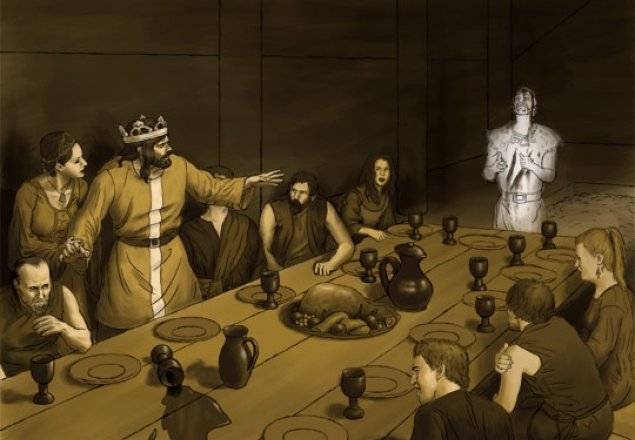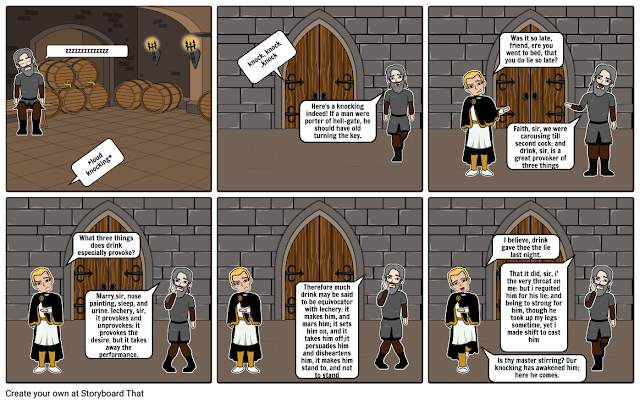An Overview of Twelfth Night or What You Will
At a Glance
Twelfth Night
Type of work: play
Genre: comedy (sub-genre: Romantic/ festive/ pastoral comedy)
Time of composition: between 1600-1602
Tone: Light, cheerful, comic; occasionally frantic and melodramatic, especially in the speeches of Orsino and Olivia.
Tense: Present (the entire story is told through dialogue)
Setting (place): The mythical land of Illyria
Twelfth Night, one of the festive comedies of Shakespeare, is a play known for its brilliant witticism, charming pastoral setting where the dramatist magnificently brings forward his philosophy of life:in idyllic pastoral settings.
Comedy, in its Elizabethan usage, had a very different meaning from modern comedy. A Shakespearean comedy is one that has a happy ending, usually involving marriages between the unmarried characters, and a tone and style that is more light-hearted than Shakespeare's other plays. Pastoral comedies employ a movement to a "green world", where both internal and external conflicts find a happy resolution.
Since it is also known as a romantic comedy, the main action revolves around the notion of love and the establishment of the same in the 'green world'. The would-be lovers must overcome obstacles andTwelfth Night has three such couples.
misunderstandings before being united in harmonious union. The ending frequently involves a parade of couples to the altar and a festive mood or actual celebration (expressed in dance, songs, feasts, etc.)
 |
| Folio version of Twelfth Night |
Frequently, but not always, a romantic comedy contains elements of the improbable, the fantastic, the supernatural, or the miraculous and Twelfth Night is no exception on more than one counts. It contains unbelievable coincidences, improbable scenes of recognition/lack of recognition, willful disregard of the social order (nobles marrying commoners, beggars changed to lords), instantaneous conversions (the wicked repent), enchanted or idealized settings, supernatural beings (witches, fairies, Gods and Goddesses). The happy ending may be brought about through supernatural or divine intervention (comparable to the deus exmachina in classical comedy, where a God appears to resolve the conflict) or may merely involve improbable turns of events.
The philosophical aspects of these plays can hardly be minimized. It focuses on such crucial themes issues of personal identity; the importance of love in human existence; the power of language to help or hinder communication; the transforming power of poetry and art; the disjunction between appearance and reality and the power of dreams and illusions.
Importance of the Twelfth Night
The play was written as a Christmas season production for presentation on Epiphany – the twelfth night after Christmas, when, according to christian tradition, Jesus was introduced to the world. This is undoubtedly a occasion for celebration and merriment when gifts are exchanged, parties with fun and frolic, songs and music, dance and amusement are held. Thus, Twelfth Night also has its own fare share of music, dance and merriment all held in the midst of the serenity of Nature or the 'green world'.
Idyllic Setting of Illyria
The city of Illyria was known to Shakespeare as an actual region off the coast of the Adriatic Sea in
the present day Albania. Illyria was thought to be ideal for many of the plot developments, themes,
 |
| Map of Illyria |
imagery, etc. that arise in the play. It acted as a generically exotic setting for a play full of romance and intrigue that are a part and parcel for a play like Twelfth Night. Its location off the coast, offered perfect preconditions for a shipwreck that finds multiple mentions in the drama. Illyria was associated with piracy in the Elizabethan mind. So the world of the unknown and the exotic were also inferred. The word “Illyria” also brings forth associations like “illusion” or the “illusory” which are greatly exploited through the comedy.
A Study of the Plot of the Play
In Twelfth Night, as in most of his works, Shakespeare has several different plot-lines going on at the same time. He expertly weaves these separate stories together throughout the play. We find different stories weaved together through an intricate web at one and the same time. They run parallel to each other. As the play begins to move towards its conclusion the different stories begin to converge until they all come together for a resolution in the final scenes.Dramatic Structure
Key Moments of the Play
1. ORSINO DECLARES HIS LOVE FOR OLIVIA (ACT 1, SCENE 1)Orsino, Duke of Illyria, declares his love for his neighbour, Countess Olivia, but his messenger tells him that she is in mourning for her dead brother and will not see any visitors for seven years.
2. A SHIPWRECK (ACT 1, SCENE 2)
A shipwreck strands Viola on the shores of Illyria and she believes that her identical twin brother, Sebastian, is drowned. She persuades the captain of the ship to dress her as a man and present her as a servant to Orsino.
3. DISORDER IN OLIVIA'S HOUSEHOLD (ACT 1, SCENE 3)
Sir Toby Belch, Olivia's uncle, is criticised by the maid, Maria, for being drunk and upsetting the peace of his mourning niece but he takes no notice. Sir Andrew Aguecheek, a foolish knight, is persuaded to stay another month in the hope of persuading Olivia to marry him. He needs her money.
4. VIOLA IS EMPLOYED BY ORSINO (ACT 1, SCENE 4)
Viola, disguised as a man and using the name Cesario, is now working for Orsino. S/he is sent with a message of love from him to Olivia but reveals to the audience that she has fallen in love with Orsino herself.
5. OLIVIA AND CESARIO MEET FOR THE FIRST TIME (ACT 1, SCENE 5)
Feste, Olivia's jester, teases his mistress out of her sadness but Malvolio, her steward, does not find him funny. Viola (dressed as Cesario) meets Olivia and declares Orsino's love for her. Olivia immediately falls in love with the young 'man' and asks 'him' to come again. To make sure of a second visit, she sends Malvolio after Cesario with a ring, saying it is a gift from Orsino that she wishes to return. This confuses Cesario, who fears that Olivia has indeed fallen for her because she is dressed as a man.
6. MALVOLIO AND SIR TOBY CROSS SWORDS (ACT 2, SCENE 3)
Sir Toby, Feste and Sir Andrew get very drunk and create a loud scene in the middle of the night.
 |
| Sir Andrew and Sir Toby |
7. MALVOLIO'S DOWNFALL IS PLOTTED (ACT 2, SCENE 5)
Hurt by Malvolio's earlier contempt and fearing that it might cost him his job, Feste plots with Sir Toby and Maria to disgrace Malvolio in front of Olivia. It is agreed that Maria will write a love letter to Malvolio which seems to come from Olivia and leave it where he cannot miss it. In it, he is asked to wear yellow stockings, cross-gartered and to smile – three things which Olivia hates. They hide behind a hedge to see the effect of the letter. Malvolio is convinced that Olivia loves him and is determined to follow the letter's instructions.
8. ANOTHER SHIPWRECK SURVIVOR ARRIVES IN ILLYRIA (ACT 3, SCENE 3)
Viola's brother, Sebastian, arrives in Illyria, believing that his twin sister is drowned. He is accompanied by a loving sailor, Antonio, who is risking his life because he is a wanted man in Illyria.
9. MALVOLIO IS IMPRISONED, SIR ANDREW ISSUES A CHALLENGE AND VIOLA LEARNS THAT HER BROTHER MAY STILL BE ALIVE (ACT 3, SCENE 4)
Following the letter's instructions, Malvolio visits Olivia in yellow stockings and cross-gartered. She takes his smiling as a sign of madness and asks Sir Toby to take care of him. Toby, Maria and Feste
imprison him in a dark dungeon.
Sir Andrew, convinced that Olivia favours Cesario over him, is persuaded by Sir Toby to challenge 'him' to a duel. Both equally terrified, Andrew and 'Cesario' fight but are interrupted by Antonio, who takes up the fight believing that 'Cesario' is his friend, Sebastian. Antonio is then arrested and begs help of 'Sebastian', who appears to reject him.
10. OLIVIA BELIEVES SHE HAS FOUND HAPPINESS (ACT 4, SCENE 3)
Olivia meets Sebastian and, believing him to be Cesario, is delighted when he agrees to marry her immediately.
11. THE RESOLUTION (ACT 5, SCENE 1)
Orsino and 'Cesario' meet Antonio and the guards on their way to prison, and are confused by his belief that 'Cesario' has abandoned him. Olivia arrives and announces that she and 'Cesario' are newly married. Orsino believes her and turns on 'Cesario', who pleads that s/he loves him.
When Sebastian appears, the twins are re-united, the confusion is resolved and Orsino and Viola are free to proclaim their love for one another.
The trick played on Malvolio is revealed and we learn that Sir Toby has married Maria. Malvolio is released from his prison cell and swears revenge on them all.








Thanks for sharing such a nice content. Your post was really good. Some ideas can be made. About English literature. Further, you can access this site to learn more about Shakespeare’s Use of Disguise in The Twelfth Night
ReplyDelete